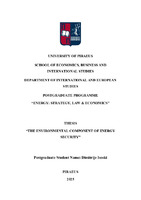| dc.description.abstractEN | This thesis investigates the environmental dimension of energy security, an aspect
that has gained increasing relevance but remains underexplored in academicdiscourse. The research aims to assess how energy security strategies impact
environmental sustainability by developing a methodological framework that
integrates both quantitative and qualitative approaches. The study focuses on four
countries—the United States, the United Kingdom, Germany, and Mexico—selectedfor their geographic, economic, and energy system diversity. A dual-method approach was employed: Z-score normalization was usedtostandardize and compare eleven environmental indicators across countries, whileexpert opinion, collected through the Delphi method, was used to assign weights toeach indicator. The results reveal notable differences in environmental performance, with the UnitedKingdom showing a positive environmental balance, the United States a negative one, and Germany and Mexico exhibiting near-neutral impacts. The study demonstrates
the value of combining statistical analysis with expert insight to obtain a morenuanced and context-sensitive understanding of energy-environment dynamics. Findings provide practical guidance for policymakers and highlight the need for moreconsistent environmental integration in energy security strategies. The researchalsoidentifies limitations in data availability and suggests directions for further
exploration, including expanding the indicator set and investigating the reciprocal
effects of climate change on energy systems. | el |



